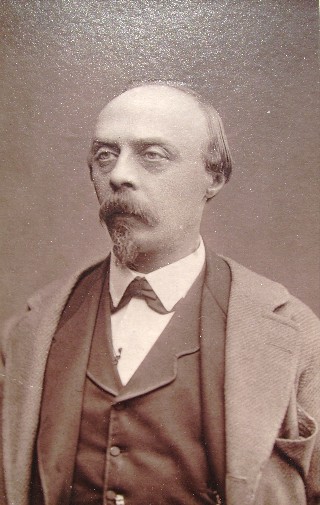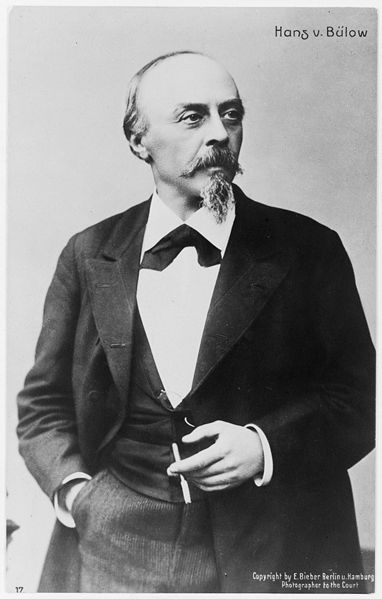<Back to Index>
- Natural Scientist Alfred Russel Wallace, 1823
- Conductor Hans Guido von Bülow, 1830
- Dictator of Spain Miguel Primo de Rivera y Orbaneja, 2 Marqués de Estella, 1870
PAGE SPONSOR


Hans Guido Freiherr von Bülow (January 8, 1830 – February 12, 1894) was a German conductor, virtuoso pianist, and composer of the Romantic era. He was one of the most famous conductors of the 19th century, and his activity was critical for establishing the successes of several major composers of the time, including Richard Wagner.
Bülow was born in Dresden, and from the age of nine he was a student of Friedrich Wieck (the father of Clara Schumann). However, his parents insisted that he study law instead of music, and sent him to Leipzig. There he met Franz Liszt, and on hearing some music of Richard Wagner — specifically, the premiere of Lohengrin in 1850 — he decided to ignore the dictates of his parents and make himself a career in music instead. He obtained his first conducting job in Zürich, on Wagner's recommendation, in 1850.
Notoriously tactless, Bülow alienated many musicians with whom he worked. He was dismissed from his Zürich job for this reason, but at the same time he was beginning to win renown for his ability to conduct new and complex works without a score. In 1851 he became a student of Liszt, marrying Liszt's daughter Cosima in 1857. They had two daughters: Daniela, born in 1860 and Blandine, born in 1863. During the 1850s and early 1860s he was active as a piano 7 recitalist, conductor, and writer, and became well-known throughout Germany as well as Russia.
In 1864 he became the Hofkapellmeister in Munich, and it was at this post he achieved his principal renown. He conducted the premieres of two Wagner operas, Tristan und Isolde and Die Meistersinger von Nürnberg, in 1865 and 1868 respectively; both were immensely successful. However, his wife Cosima, who had been carrying on an extramarital affair with Richard Wagner for some time, left him in 1868, taking with her two of their four daughters, Isolde and Eva — the two whom Richard Wagner had fathered — and in 1870 divorced Bülow. In spite of this, Bülow remained a disciple of Wagner, and never seemed to hold a grudge; indeed he mourned the death of Wagner, and continued to conduct his work.
In 1867 von Bülow became director of the newly reopened Königliche Musikschule in Munich. He taught piano there in the manner of Liszt. He remained as director of the Conservatory until 1869.
In addition to championing the music of Wagner, von Bülow was a supporter of the music of both Brahms and Tchaikovsky. He gave the American premiere of the Tchaikovsky Piano Concerto No. 1 in Boston in 1875.
From 1878 to 1880 he was Hofkapellmeister in Hanover but was forced to leave after fighting with a tenor singing the "Knight of the Swan [Schwann]" role in Lohengrin; von Bülow had called him the "Knight of the Swine [Schwein]". In 1880 he moved to Meiningen where he took the equivalent post, and where he built the orchestra into one of the finest in Germany; among his other demands, he insisted that the musicians learn to play all their parts from memory.
It was during his five years in Meiningen that he met Richard Strauss (though the meeting actually took place in Berlin). His first opinion of the young composer was not favorable, but he changed his mind when he was confronted with a sample of Strauss's "Serenade." Later on, he used his influence to give Strauss his first regular employment as a conductor. Like Strauss, Bülow was attracted to the ideas of Max Stirner, whom he reputedly had known personally. In April 1892 Bülow closed his final performance with the Berlin Philharmonic (where he had been serving as Principal Conductor since 1887) with a speech "exalting" the ideas of Stirner. Together with John Henry Mackay, Stirner's biographer, he placed a memorial plaque at Stirner's last residence in Berlin.
Some of his orchestral innovations included the addition of the five-string bass and the pedal timpani; the pedal timpani have since become standard instruments in the symphony orchestra. His accurate, sensitive, and profoundly musical interpretations established him as the prototype of the virtuoso conductors who flourished at a later date. He was also an astute and witty musical journalist.
In the late 1880s he settled in Hamburg,
but continued to tour, both conducting and performing on the piano.
Bülow suffered from chronic neuralgiforme headaches, which were
caused by a tumor of the cervical radicular nerves. After
about 1890 his mental and physical health began to fail, and he sought
a warmer, drier climate for recovery; he died in a hotel in Cairo, Egypt, only ten months after his last concert performance.
Quotations: